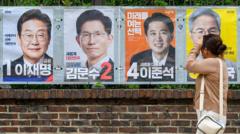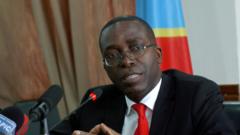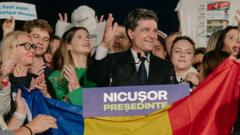His journey reflects a mix of resilience, controversy, and the volatility of South Korean politics.
**Political Turmoil Paves the Way for Lee Jae-myung's Presidential Trajectory**

**Political Turmoil Paves the Way for Lee Jae-myung's Presidential Trajectory**
In the aftermath of political strife, Lee Jae-myung rises as South Korea's leading presidential contender.
Lee Jae-myung has emerged as a significant contender for the South Korean presidency, a position he is vying for amidst a backdrop of political upheaval. Prior to the tumultuous events of December 3, 2024—when former president Yoon Suk Yeol attempted to impose martial law—Lee’s ambitions seemed threatened by ongoing legal challenges, including corruption allegations, which could have hampered his aspirations for a second presidential run. However, this constitutional crisis dramatically shifted his political landscape, allowing Lee to capitalize on Yoon's missteps.
At 61, Lee is now the Democratic Party's candidate, poised as a frontrunner in the election scheduled for June 3. His political journey took a remarkable turn following the martial law declaration, which by then had led to a conviction for false statements made during his previous presidential campaign. Although the shadow of these charges looms over him, Lee has transformed adversity into opportunity.
Dr. Lee Jun-han, a political expert, explains that Lee’s compelling narrative as a political outsider, combined with his aggressive reformist ideas such as a universal basic income, has garnered him both fervent support and considerable criticism. "He is unconventional and often provokes strong opinions,” Dr. Lee noted, highlighting the polarization that has characterized Lee's public image.
Born in 1963 in a modest mountain village, Lee’s upbringing was marred by adversity. He faced a harsh childhood, leaving school early to work in factories and enduring injuries that would shape his resilience. His journey from human rights lawyer to political figure began in 2005, and he became prominent through welfare initiatives and his management of the Covid-19 crisis as Gyeonggi Province governor, which put him at odds with the central government.
Lee’s tenure has not been devoid of controversy. Despite efforts to soften his approach after earlier aggressive tactics led to backlash, he has continually battled scandals ranging from personal controversies to serious allegations tied to a high-profile land development project. His legal troubles involve not only accusations of corruption but also his conviction for false statements—a case that has galvanized his critics and supporters alike.
The stakes grew even higher following an assassination attempt in early 2024, where Lee was attacked while engaging with supporters. This attack has drawn attention to the increasingly volatile political climate in South Korea, which many experts assert is exacerbated by intense polarization and rising tensions between political factions.
The political crisis reached a tipping point when Yoon declared martial law in an attempt to dismantle perceived “anti-state” sentiments. Lee seized the moment, rallying the public and leading opposition efforts that culminated in a successful impeachment of Yoon—shattering the former president’s authority and, unexpectedly, paving the way for Lee’s ascension. He officially announced his candidacy days after resigning as the Democratic Party leader and quickly gained significant traction in the party primaries.
As the electoral season progresses, Lee’s position remains precarious. With forthcoming court rulings regarding his legal matters, much rides on his political future. A conviction could jeopardize both his presidential ambitions and his political career, while his ability to delay legal proceedings speaks to the unpredictable nature of South Korean politics. As the nation faces potential unrest from the recent upheaval, all eyes will be on Lee Jae-myung, a seasoned political figure vying for a transformative period in South Korea's governance.
At 61, Lee is now the Democratic Party's candidate, poised as a frontrunner in the election scheduled for June 3. His political journey took a remarkable turn following the martial law declaration, which by then had led to a conviction for false statements made during his previous presidential campaign. Although the shadow of these charges looms over him, Lee has transformed adversity into opportunity.
Dr. Lee Jun-han, a political expert, explains that Lee’s compelling narrative as a political outsider, combined with his aggressive reformist ideas such as a universal basic income, has garnered him both fervent support and considerable criticism. "He is unconventional and often provokes strong opinions,” Dr. Lee noted, highlighting the polarization that has characterized Lee's public image.
Born in 1963 in a modest mountain village, Lee’s upbringing was marred by adversity. He faced a harsh childhood, leaving school early to work in factories and enduring injuries that would shape his resilience. His journey from human rights lawyer to political figure began in 2005, and he became prominent through welfare initiatives and his management of the Covid-19 crisis as Gyeonggi Province governor, which put him at odds with the central government.
Lee’s tenure has not been devoid of controversy. Despite efforts to soften his approach after earlier aggressive tactics led to backlash, he has continually battled scandals ranging from personal controversies to serious allegations tied to a high-profile land development project. His legal troubles involve not only accusations of corruption but also his conviction for false statements—a case that has galvanized his critics and supporters alike.
The stakes grew even higher following an assassination attempt in early 2024, where Lee was attacked while engaging with supporters. This attack has drawn attention to the increasingly volatile political climate in South Korea, which many experts assert is exacerbated by intense polarization and rising tensions between political factions.
The political crisis reached a tipping point when Yoon declared martial law in an attempt to dismantle perceived “anti-state” sentiments. Lee seized the moment, rallying the public and leading opposition efforts that culminated in a successful impeachment of Yoon—shattering the former president’s authority and, unexpectedly, paving the way for Lee’s ascension. He officially announced his candidacy days after resigning as the Democratic Party leader and quickly gained significant traction in the party primaries.
As the electoral season progresses, Lee’s position remains precarious. With forthcoming court rulings regarding his legal matters, much rides on his political future. A conviction could jeopardize both his presidential ambitions and his political career, while his ability to delay legal proceedings speaks to the unpredictable nature of South Korean politics. As the nation faces potential unrest from the recent upheaval, all eyes will be on Lee Jae-myung, a seasoned political figure vying for a transformative period in South Korea's governance.


















